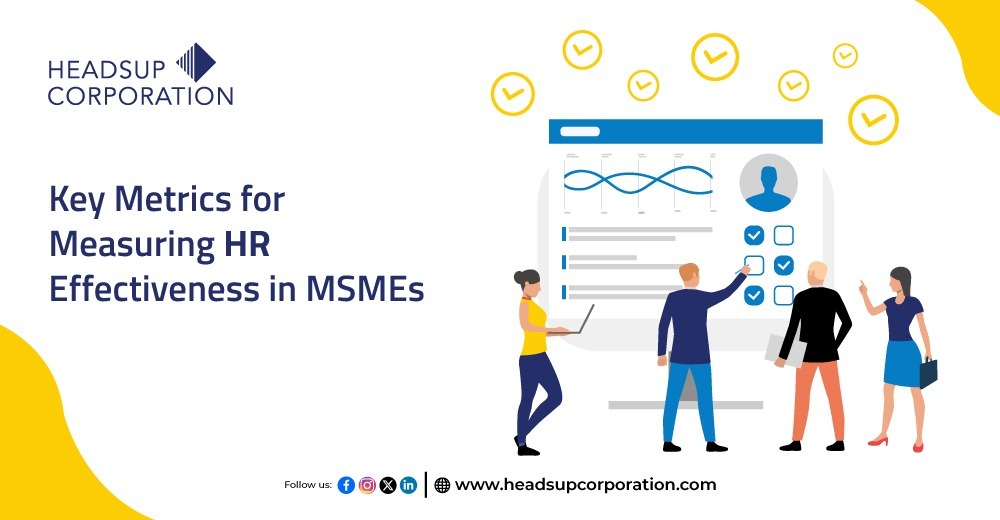
Key Metrics for Measuring HR Effectiveness in MSMEs
Ever wondered what sets thriving MSMEs apart from the struggling ones? The answer often lies in their ability to effectively manage their most valuable asset: people. In the constantly moving environment of Micro, Small, and Medium Enterprises (MSMEs), the presence of human resources is pivotal, though often underappreciated. As we delve deeper into the intricacies of HR effectiveness, one question emerges: What are the methods used by MSMEs to measure whether their HR practices are effective or not? This is the crux of our investigation as we embark on a trip to expose the precise indications that drive prosperity in MSMEs. Join us as we navigate through the realm of HR metrics, guided by the expertise of Headsup Corporation, an HR consulting and operations company committed to unlocking the potential of MSMEs.
Understanding HR Metrics Effectiveness in MSMEs
It is necessary to realise the significance of human resource metrics for micro, small, and medium enterprises (MSMEs) in order to ensure effective resource utilisation. They help us understand employees‘ performance, how engaged they are, if they leave the team or even the company itself, and how much of our capacity is actually used in the end. Through such metrics, MSMEs can increase productivity as well as provide employees with better working conditions. Whether it is tracking employee turnover or evaluating training programmes, the numbers help to locate areas for improvement. Armed with this data, MSMEs can enhance their workflow and cultivate a dynamic and energetic workplace.
Several Types of HR Metrics
There are three distinct categories of HR metrics, each offering unique insights crucial for MSMEs.
Strategic Metrics: Strategic metrics work as the compass as they align HR efforts with the overarching goals and vision of the organisation. These metrics provide a wider view, helping to make strategic decisions and allocate resources.
Operational Metrics: Operational metrics delve into the day-to-day difficulties of HR functions, offering granular insights into efficiency and effectiveness. From recruitment to training and performance management, operational metrics illuminate areas ripe for optimisation and enhancement.
Compliance Metrics: Compliance metrics stand guard, ensuring adherence to legal and regulatory standards. Vital for risk mitigation and maintaining organisational integrity, compliance metrics also safeguard MSMEs against potential pitfalls.
Key Metrics for Measuring HR Effectiveness in MSME
Time-to-fill:
It expresses how many days pass between the beginning of your hiring process and hiring your first employee. Monitoring this indicator is critical as it provides information about how long it takes your team to identify the best applicant for each position and also whether there are any process bottlenecks.
Cost Per Hire:
This figure illustrates the cost of hiring a single employee for your business. Maintaining a record of this data for each time a job offer extends will assist in pinpointing any instances in which HR costs are high and will also demonstrate the efficacy of different hiring tactics in terms of filling available positions (e.g., whether referrals result in better hires than job boards).
Quality of Hire:
Candidate Quality Score (CSQ) helps assess a candidate’s chances of succeeding in the position. One can determine CSQs by taking a candidate’s performance on your assessment exams and comparing it to their pre-employment performance.
Training Return on Investment:
The effectiveness or profitability of the money invested in training is gauged by the return on investment, or ROI. Although it has a stronger financial and economic effect. You only have to calculate the top 5% of training programmes with the greatest impact.
New Hire Turnover Rate:
Within the first year of employment, the percentage of workers that quit is known as the new hire turnover rate. For MSMEs, this number is crucial since it demonstrates how successfully you’re keeping on new personnel.
Goal Achievement Rate:
This indicates the alignment of staff performance with the organisation’s goal. MSMEs assess the effectiveness of goal-setting procedures and also highlight areas for development by measuring the achievement of goals.
Performance Rating Distribution:
It helps to reveal the patchwork of employee performance and highlight trends and patterns within the company. This measure gives MSMEs the ability to identify talent and also wisely distribute resources.
Why Choose Headsup Corporation for MSME HR Solutions?
Tailored HR Solutions for MSMEs:
The HR consultants at Headsup Corporation have expertise in creating custom solutions that match the unique demands and limitations of MSMEs. These solutions, from personnel management to recruiting, maximise effectiveness and optimise resources. Hence, enabling MSMEs to prosper in a competitive environment.
Expertise in Implementing and Interpreting HR Metrics:
With decades of experience in HR metrics, our HR consultants act as skilled guides, assisting MSMEs in understanding the complications of performance evaluation. Additionally, we help in decision-making for MSMEs through strong metrics frameworks and the interpretation of data insights. Hence, we enhance efficiency and effectiveness in all HR operations.
Providing Guidance for Continuous Improvement:
Due to Headsup Corporation’s steadfast commitment to quality, it actively engages as a collaborative partner in development endeavours. During the growth period of the company, our HR consultants offer MSMEs advanced guidance and help. Our consultancies foster a culture of continuous improvement through proactive efforts and strategic interventions. This enables MSMEs to bloom in the face of changing market conditions.






